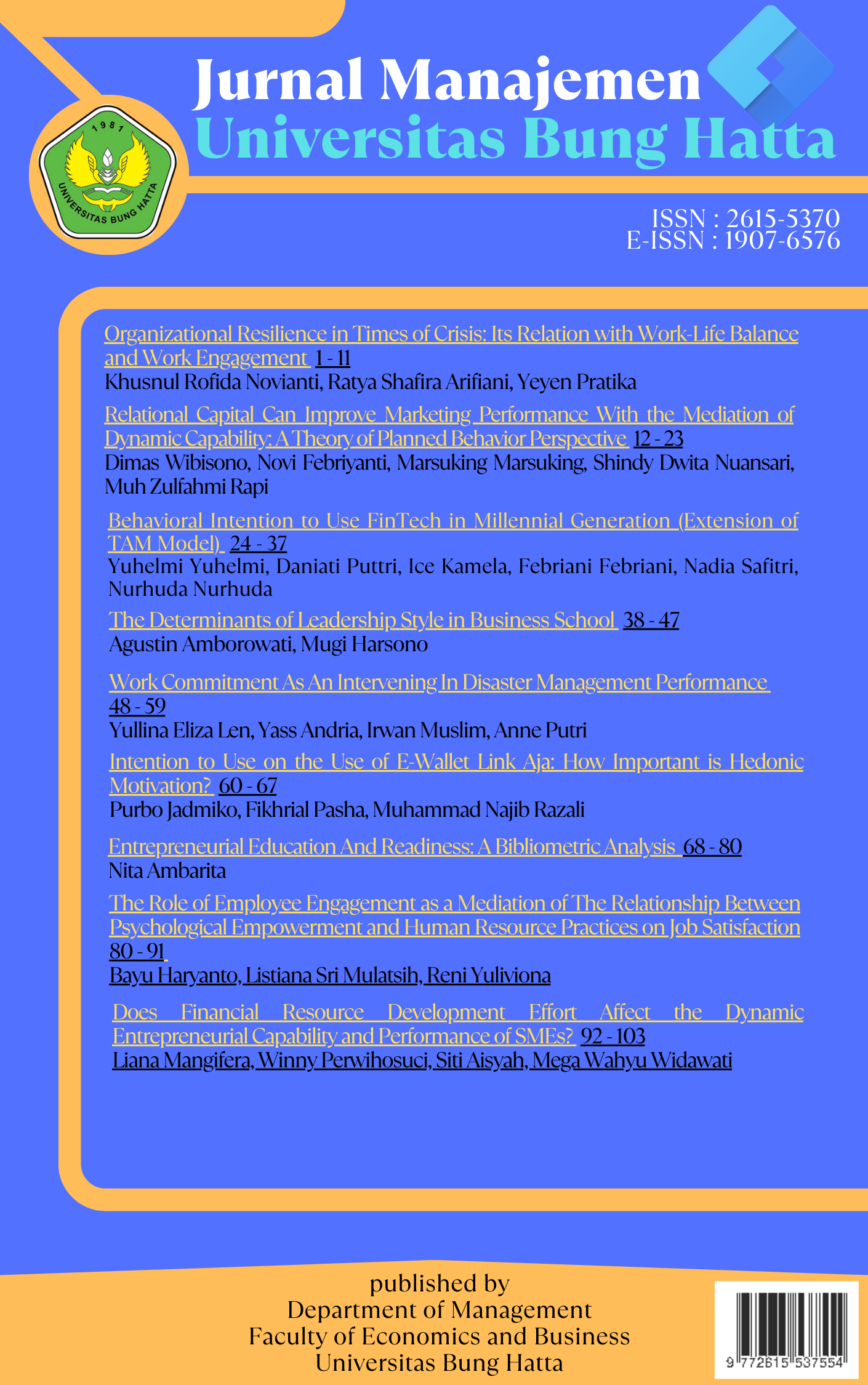The Determinants of Leadership Style in Business School
DOI:
https://doi.org/10.37301/jmubh.v19i1.24412Keywords:
leadership, leadership styleAbstract
Leadership plays a central role in determining the direction, culture, and performance of an organization. In the context of globalization, an effective leadership style is becoming increasingly important, as leaders need to be able to face the various challenges facing organizations at the global level. Leadership style refers to the leader's methods and behaviors when directing, motivating, and managing others (Fonseca Da Costa Guterresa et al., 2020). A leader's style is shaped by a variety of factors, including personality, values, skills, and experience, and can have a significant impact on the effectiveness of their leadership. The research design used was in the form of a survey. The primary data source obtained in this study was carried out by distributing questionnaires directly to students. Secondary data sources in this study are Human Resource Management Books and previous research journals related to the research topic, namely about Leadership Style. In this study, researchers will describe the Leadership Style possessed by students. Generation Z shows a strong preference for participatory, collaborative and technology-oriented leadership. Participatory leaders listen to and value team input, promote collaboration, and create an inclusive environment (Hassan et al., 2016). This research makes an important contribution to our understanding of Generation Z's preferences and leadership styles in the global economy. These results can assist organizations, leaders, and academics in developing more effective leadership strategies to guide and support future leaders.
References
Alanoglu, M. (2022). The role of instructional leadership in increasing teacher self-efficacy: a meta-analytic review. Asia Pacific Education Review, 23(2), 233–244. https://doi.org/10.1007/s12564-021-09726-5
Almutairi, Y. M. N. (2020). Leadership self-efficacy and organizational commitment of faculty members: Higher education. Administrative Sciences, 10(3). https://doi.org/10.3390/admsci10030066
Bergman, D., Sendén, M. G., & Berntson, E. (2019). Preparing to lead in combat: Development of leadership self-efficacy by static-line parachuting. Military Psychology, 31(6), 481–489. https://doi.org/10.1080/08995605.2019.1670583
Fonseca Da Costa Guterresa, L., Armanu, & Rofiaty. (2020). The role of work motivation as a mediator on the influence of education-training and leadership style on employee performance. Management Science Letters, 10(7), 1497–1504. https://doi.org/10.5267/j.msl.2019.12.017
Hai, T. N., Van, T. T., & Thi, H. N. (2021). Relationship between transformational leadership style and leadership thinking of provincial administration leaders. Emerging Science Journal, 5(5), 714–730. https://doi.org/10.28991/esj-2021-01307
Hassan, H., Asad, S., & Hoshino, Y. (2016). Determinants of Leadership Style in Big Five Personality Dimensions. Universal Journal of Management, 4(4), 161–179. https://doi.org/10.13189/ujm.2016.040402
Heimann, A. L., Ingold, P. V., & Kleinmann, M. (2020). Tell us about your leadership style: A structured interview approach for assessing leadership behavior constructs. Leadership Quarterly, 31(4), 101364. https://doi.org/10.1016/j.leaqua.2019.101364
Kim, A. Y., & Sim, I. O. (2020). Mediating factors in nursing competency: A structural model analysis for nurses’ communication, self-leadership, self-efficacy, and nursing performance. International Journal of Environmental Research and Public Health, 17(18), 1–14. https://doi.org/10.3390/ijerph17186850
Kim, T. eun, Sydnes, A. K., & Batalden, B. M. (2021). Development and validation of a safety leadership Self-Efficacy Scale (SLSES) in maritime context. Safety Science, 134(December 2019). https://doi.org/10.1016/j.ssci.2020.105031
Labrague, L. J., Al Sabei, S., Al Rawajfah, O., AbuAlRub, R., & Burney, I. (2021). Authentic leadership and nurses’ motivation to engage in leadership roles: The mediating effects of nurse work environment and leadership self-efficacy. Journal of Nursing Management, 29(8), 2444–2452. https://doi.org/10.1111/jonm.13448
Mujeeb, T., Khan, N. U., Obaid, A., Yue, G., Bazkiaei, H. A., & Samsudin, N. A. (2021). Do servant leadership self-efficacy and benevolence values predict employee performance within the banking industry in the post-covid-19 era: Using a serial mediation approach. Administrative Sciences, 11(4). https://doi.org/10.3390/admsci11040114
Nguyen, D. H. K. (2016). Student success through leadership self-efficacy: A comparison of international and domestic students. Journal of International Students, 6(4), 829–842. https://doi.org/10.32674/jis.v6i4.320
Prayogi, M. A., & Lesmana, M. T. (2021). The Influence of Leadership Style and Motivation on the Performance of Employees. 161(Ciiber 2019), 122–127. https://doi.org/10.2991/aebmr.k.210121.019
Purwanto, A., Bernarto, I., Asbari, M., Mayesti Wijayanti, L., & Chi Hyun, C. (2020). Effect of Transformational and Transactional Leadership Style. Journal of Research in Business, Economics, and Education, 2(2), 38–87. http://e-journal.stie-kusumanegara.ac.id
Roy, F. I., & Sumartik, S. (2021). The Effect of Leadership, Self-Efficacy and Work Motivation on Work Discipline With
Downloads
Published
Issue
Section
License
Copyright (c) 2024 Agustin Amborowati, Mugi Harsono

This work is licensed under a Creative Commons Attribution-ShareAlike 4.0 International License.
Authors who publish with Jurnal Manajemen Universitas Bung Hatta agree to the following terms:
- Authors retain copyright and grant the journal right of first publication with the work simultaneously licensed under a Creative Creative Commons Attribution-ShareAlike 4.0 International License that allows others to share the work with an acknowledgement of the work's authorship and initial publication in Jurnal Manajemen Universitas Bung Hatta.
- The author holds the copyright of the submitted and published articles, with the understanding that articles are disseminated under the Creative Commons Attribution-ShareAlike 4.0 International License..
- The editor team is entitled to do the editing in accordance with the guidelines for writing or template in the Jurnal Manajemen Universitas Bung Hatta.
This work is licensed under a Creative Commons Attribution-ShareAlike 4.0 International License.












